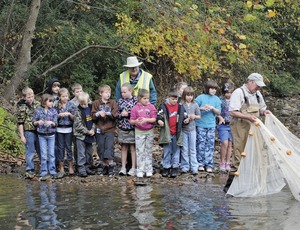
In a corner of Appalachia used to visits from bureaucrats and other would-be do-gooders, it's not hard to understand why, a decade ago, the people of Tennessee's Coal Creek region were suspicious of geotechnical engineer Barry Thacker's offer to clean up their mine waste-tainted waterways.
Thacker, president of Knoxville-based GeoEnvironmental Associates Inc. and an avid fisherman, thought his skills could improve the trout habitat, but he never envisioned the life-changing impact his Coal Creek Watershed Foundation (CCWF) would have on the community of Briceville, Tenn.
The foundation has connected its members, young and old, to their unique environment and rich coal mining history, as well as to the poverty-eradicating power of a college degree and new revenue-producing options.
To date, his non-profit group has awarded more than $250,000 in scholarships to 32 students who had few, if any, choices for higher education.
As the first high school student there to take community college classes before graduation, senior Victoria Wright is now eyeing a career in engineering or robotics technology
 |
| Thacker |
"My grandpa always told me to be a nurse, but I grew up in the workshop with my dad and I didn't want to do what every high school girl was doing," she says. "During high school [the foundation] give us a chance to do community service for the exchange of a $10,000 scholarship. We learn about our community and we've even been able to help a [Harvard University] author writing about the history of the Welsh coal miners here."
Thacker and Carol Moore, the firm's administrative manager and CCWF's go-to person, have become Briceville's key academic partners—in and out of class—from kindergarten on.
"When we started the [scholarship] program, we would ask the elementary school students how many of them wanted to go to college and a few would raise their hands," says Moore. "When we ask that question now, all the students raise their hands."
The foundation, which also has received donations from the Tennessee Valley Authority, area mining companies, contractors and public entities, has also funded significant upgrades to the region's drinking water system, health care delivery and historic structures.
"The chronic unemployment that helped devastate the community after the coal mines went fallow is being replaced by a new economic driver: the tourist industry," says Moore. "A coal-mining history museum is in the works."
"Barry has discovered that while people may not be projects, a community could be, and you can take engineering principles and apply them to great effect," Moore says. "For many folks, he is the only engineer they know and, based on that, they LOVE engineers. Barry has been steadfast in encouraging other engineers to follow his lead."
Thacker is adamant, even obsessive, that his P.E. credentials or reference to being "an engineer" are included in all media writeups.
While Thacker has been an industry gadfly related to engineering issues, his community efforts have made him a regional celebrity and helped him gain lawmaker attention and client support. "He's a power in that area, and he's known as an engineer," says John Bachner, executive director of ASFE, the national geotechnical engineering professional group. "Imagine if this was replicated in 100 places."
Any bottom-line impacts to Thacker's firm by his focus on foundation activities seem to be countered by new business those efforts have attracted. "The bottom line is that Geo/Environmental Associates today is in so much demand, it’s almost unreal," says Moore.
Says Thacker, "Engineering puts me in contact with decisionmakers, but there's nothing better than getting involved with a community."






Post a comment to this article
Report Abusive Comment